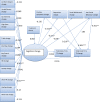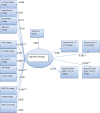Does change in cognitive function predict change in costs of care for people with a schizophrenia diagnosis following cognitive remediation therapy?
- PMID: 24682210
- PMCID: PMC4193717
- DOI: 10.1093/schbul/sbu046
Does change in cognitive function predict change in costs of care for people with a schizophrenia diagnosis following cognitive remediation therapy?
Abstract
Background and aims: Schizophrenia leads to significant personal costs matched by high economic costs. Cognitive function is a strong predictor of disabilities in schizophrenia, which underpin these costs. This study of cognitive remediation therapy (CRT), which has been shown to improve cognition and reduce disability in schizophrenia, aims to investigate associations between improvements in cognition and cost changes.
Methods: Eighty-five participants with schizophrenia were randomized to receive CRT or treatment as usual and were assessed at baseline, posttherapy, and 6 month follow-up. Four structural equation models investigated associations between changes in cognitive function and costs of care.
Results: All 4 models provided a good fit. Improvement in 3 individual cognitive variables did not predict total cost changes (model 1). But improvement in a single latent cognition factor was associated with a reduction in depression, which in turn was associated with reduced subsequent total costs (model 2). No significant associations with constituent daycare and special accommodation cost changes were apparent with 3 individual cognitive change variables (model 3). But improvement in a single latent cognitive change variable was associated with subsequent reductions in both daycare and special accommodation costs (model 4).
Conclusion: This study exemplifies a method of using cost changes to investigate the effects and mechanisms of CRT and suggests that executive function change may be an important target if we are to reduce disability and resultant health and social care costs.
Keywords: cognition; cognitive predictors; executive function; functioning; working memory.
© The Author 2014. Published by Oxford University Press on behalf of the Maryland Psychiatric Research Center.
Figures




References
-
- Wittchen HU, Jacobi F, Rehm J, et al. The size and burden of mental disorders and other disorders of the brain in Europe 2010. Eur Neuropsychopharmacol. 2011;21:655–679 - PubMed
-
- Gustavsson A, Svensson M, Jacobi F, et al. ; CDBE2010Study Group. Cost of disorders of the brain in Europe 2010. Eur Neuropsychopharmacol. 2011;21:718–779 - PubMed
-
- Rethink. Effective Interventions for Schizophrenia – The Economic Case. London, UK: Rethink; 2012
-
- Heinrichs RW, Zakzanis KK. Neurocognitive deficit in schizophrenia: a quantitative review of the evidence. Neuropsychology. 1998;12:426–445 - PubMed
Publication types
MeSH terms
Grants and funding
LinkOut - more resources
Full Text Sources
Other Literature Sources
Medical
Research Materials

